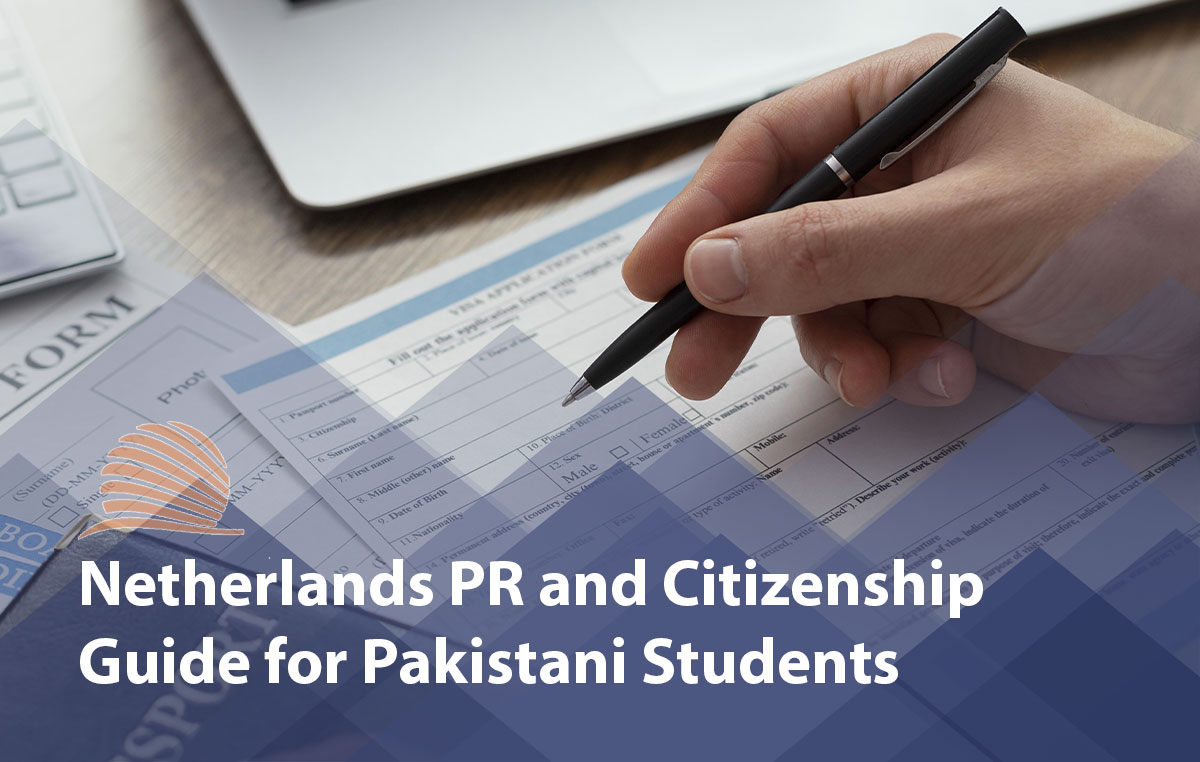Why Pakistani Students Choose Netherlands As Study Destination

Study abroad expert advice
Don't waste time! just fill the form to get help.
PR & Citizenship in the Netherlands for Pakistani Students
For many Pakistani students, studying in the Netherlands is not just about earning a degree — it’s the beginning of a long-term journey toward building a successful career and life in Europe. The Netherlands, with its stable economy, inclusive society, and welcoming immigration policies, provides clear pathways for international students to apply for Permanent Residency (PR) and eventually Dutch citizenship.
This article explains how Pakistani students can transition from being international students to permanent residents, detailing the eligibility criteria, visa conversion process, benefits, and citizenship requirements in 2025 and beyond.
Post-Study Work Opportunities in the Netherlands
After completing your studies, the first step toward PR is the Orientation Year Visa (Zoekjaar).
The Dutch government allows international graduates — including Pakistani students — to stay in the country for one additional year after graduation to look for employment or start a business.
Eligibility for Orientation Year Visa:
- Must have completed a bachelor’s, master’s, or PhD degree in the Netherlands.
- Must apply within 3 years of graduation.
- Can work in any sector without needing a separate work permit.
This visa helps graduates find full-time work, which later qualifies them for a residence permit based on employment.
Transition from Student Visa to Work Visa
Once you secure a job, you can apply for a Highly Skilled Migrant (HSM) Visa, also known as the Knowledge Migrant Visa.
This visa is employer-sponsored and allows professionals to live and work in the Netherlands legally.
Key points:
- Employer must be recognized by the Immigration and Naturalisation Service (IND).
- Minimum gross annual salary (2025 estimate):
- Under 30 years: €3,800/month
- Over 30 years: €5,000/month
- Valid for up to 5 years and renewable.
The period spent under this visa counts toward the 5-year residence requirement for permanent residency.
Requirements for Permanent Residency (PR) in the Netherlands
After legally living in the Netherlands for five consecutive years, Pakistani students can apply for Permanent Residence (Permanent Residence Permit).
Eligibility Criteria:
- Continuous legal stay in the Netherlands for at least 5 years.
- Valid residence permit during the entire period.
- Stable income or employment record.
- Passed the Civic Integration Exam (Inburgeringsexamen) — to demonstrate basic Dutch language and social knowledge.
- No criminal record or security violations.
PR Requirement | Details for Pakistani Students |
Minimum Stay | 5 consecutive years |
Language Test | Dutch A2 level (Civic Integration Exam) |
Employment | Proof of stable income or full-time job |
Valid Residence Permit | Must be maintained continuously |
Application Fee (approx.) | €210 |
Processing Time | 3–6 months |
Benefits of PR in the Netherlands
Obtaining Dutch Permanent Residency offers numerous advantages, including long-term security, access to public benefits, and career flexibility.
Main Benefits:
- Indefinite Stay: No need to renew temporary visas repeatedly.
- Full Work Rights: Freedom to work in any company or start your own business.
- Social Security Benefits: Access to healthcare, pensions, and unemployment benefits.
- Education & Family Rights: Family members can join under family reunification programs.
- Travel Freedom: Visa-free travel within the Schengen Area for up to 90 days.
Applying for Dutch Citizenship
After maintaining permanent residency for five years, Pakistani nationals can apply for Dutch citizenship through naturalization.
Eligibility for Citizenship:
- Must have legally lived in the Netherlands for at least 5 years (including PR period).
- Must pass the Dutch language test (A2 or B1 level).
- Must have a clean criminal record.
- Must demonstrate integration into Dutch society.
- Must be willing to renounce Pakistani citizenship (since Pakistan doesn’t allow dual nationality with the Netherlands).
The naturalization process can take 6–12 months, depending on documentation and verification.
Pathway Summary
Stage | Duration | Visa Type | Main Requirement | Outcome |
Study Period | 2–4 years | Student Visa | Enrollment in Dutch university | Degree completion |
Post-Study Period | 1 year | Orientation Year Visa | Job search or entrepreneurship | Employment secured |
Work Period | 3–5 years | Highly Skilled Migrant Visa | Continuous legal stay & employment | Eligible for PR |
PR Period | 5 years | Permanent Residence Permit | Integration exam, stable income | PR granted |
Citizenship | 5+ years | Naturalization | Dutch language proficiency | Dutch Passport |
Dual Citizenship Consideration
The Netherlands generally does not allow dual citizenship, meaning Pakistani citizens must renounce their Pakistani nationality upon obtaining Dutch citizenship. However, exceptions apply for:
- Refugees
- Marriage to a Dutch citizen
- Individuals who cannot renounce due to legal restrictions
Pakistani students should carefully evaluate this step, considering future plans for travel, family, and property ownership in Pakistan.
Challenges and Recommendations
While the PR and citizenship processes are straightforward, students should be prepared for:
- Documentation challenges (especially translations and verifications).
- Language barriers during the civic exam.
- Legal guidance required during the naturalization stage.
It is highly recommended to consult with university international offices or immigration advisors for accurate guidance during the transition from student to permanent resident.
Conclusion
The Netherlands offers Pakistani students not only a high-quality education but also a stable and transparent path toward permanent residency and citizenship. By following the legal steps — from study to work to PR — Pakistani graduates can build successful, long-term careers in one of Europe’s most progressive and inclusive countries.
Living, working, and eventually becoming a citizen of the Netherlands opens doors to global opportunities, cultural enrichment, and a prosperous future in the heart of Europe.









 (1).jpg)
.jpg)
.jpg)
.jpg)

.jpg)